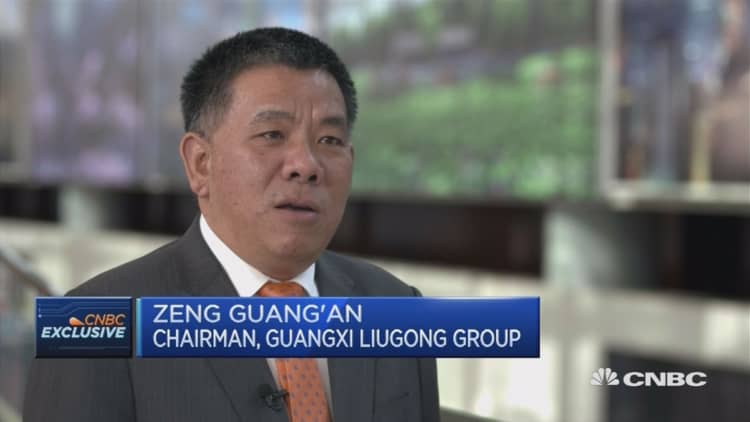
Beijing's giant plan to invest billions abroad is creating a favorable business environment for Chinese companies expanding internationally, said Zeng Guang'an, the chairman of construction machinery firm LiuGong.
The initiative, dubbed "One Belt, One Road," aims to boost Chinese influence and investment by strengthening infrastructure and trade links with the rest of the world. On the ground, this means building a vast logistics and transport network. In the long run, it's meant to increase the country's global clout, shore up access to energy resources and seek growth abroad as the domestic economy slows.
Some countries have been less keen to embrace the plan, but Zeng told CNBC that attitudes are changing and Beijing's blessing to splash cash abroad will be a boon for Chinese companies.
"The business environment is getting better," he said. "Countries in the OBOR region — the people, the companies, customers — understand this is good."
For a company like LiuGong, which manufactures cranes, piling machinery and more, there's a clear benefit as China looks to build advanced infrastructure in neighboring countries.
LiuGong already does business in 140 countries — 50 of which are specifically named in China's "One Belt, One Road" plan. The company manufactures its construction equipment in China, Brazil, India and Poland, and is looking to expand into Russia. About one third of its revenue comes from overseas, and the firm is aiming to boost that to 50 percent. To get there, Zeng said he expects to invest at least $1 billion in international expansion.
"I don't worry too much about profitability," Zeng said. "I worry about the political risks and the market risks … [and] market uncertainty, because some of those countries, their economy is not stable."
There are also currency fluctuations and challenges in adapting to the local environment and culture, he added.
The firm takes years — sometimes as long as a decade — to study these risks before getting into certain countries. In some cases, LiuGong has decided against or halted overseas investment given concerns.
One of the big concerns with China's international investment plan is whether state-owned and private firms are pushed into spending on projects that won't generate returns, simply to achieve Beijing's political aims, and whether the initiative can attract additional private capital.
Zeng said he didn't see this as an issue, as plenty of private investors have already piled in, or seem to be interested in doing so. The projects pursued "have a good return on their investments," he said.
Even institutions like the World Bank are eyeing OBOR as an opportunity to seek greater rewards. The organization's president, Jim Yong Kim, pointed to the $40 trillion in investments earning less than 1 percent in returns, and another half a trillion in bonds with negative interest rates.
Given slowing growth at home, it's "a very important strategy to have more business from outside China and to balance the domestic risk," Zeng said.
LiuGong is listed in Shenzhen, and shares are up 10 percent so far this year.


